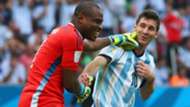
With the 2010s drawing to a close, who was Nigeria’s standout player during the decade?
As the decade draws to an end, Goal writers Seye Omidiora and Solace Chukwu argue their picks for Nigeria‘s Player of the Decade.
Comment below and let us know who you believe ought to be recognised as the Super Eagles’ best player of the last 10 years.

Mikel John Obi
by Seye Omidiora
Selfless, cooperative and a leader of men; Mikel John Obi’s transformation in this decade was extraordinary, especially after events in the preceding years.
After intermittent run-ins with the federation’s higher-ups previously, the former Chelsea midfielder took up a talismanic role in the national team following the retirement of Joseph Yobo and Vincent Enyeama in 2014 and 2015 respectively.
As his influence grew, fans took to the midfielder as they became fond of his willingness to give his all for the team, no matter the circumstances.
Even though he missed the World Cup in South Africa through injury, Mikel bounced back by playing every minute of Nigeria’s Africa Cup of Nations triumph in 2013.
However, that was only the start for the then-Chelsea man, who was to prove his commitment to the nation’s cause over the next few years.
The Super Eagle’s greatest sacrifice for the West African nation didn’t come for the senior side, however, but for the Olympics team in Rio in 2016.
Following the Nigeria Football Federation’s disgraceful delay to fund the team’s travel and upkeep expenses, the side were stuck in the United States, and were in danger of missing their opening game against Japan.

Mikel was to be the benefactor of the side, as the players travelled to South America on the day of their opening game against the East Asian country, which they won 5-4.
That rip-roaring nine-goal thriller was to serve as a catalyst for the Dream Team’s run to a Bronze medal, which, as it turned out was Nigeria’s only honour at the Games.
The eventual success made the captain’s sacrifice even more significant, given modern footballers are largely seen as egocentric species who don’t give two hooks about anything or anyone besides themselves.
Mikel saved the nation from the global embarrassment and led them to third-place, a success recorded against all odds.
From that point on, there was little the nation’s captain could do wrong, as his selflessness was celebrated across the country.
It was only fitting that the stars aligned for the Nigeria captain with the senior team as well.
Gernot Rohr’s appointment in 2016 brought the West Africans back to prominence after their prolonged slumber, and Mikel played a central role in the rise of the Super Eagles from the ashes.
The three-time African champions qualified to the 2018 World Cup without having to worry, and they did the same for Afcon 2019 regardless of their 2-0 home defeat by South Africa in June 2017.

Rohr’s charges, led by Mikel, showed Nigerians there was another way of approaching qualifiers without having to resort to last-minute permutations.
The Trabzonspor midfielder retired from international football having claimed Afcon success in 2013, while leading the Super Eagles to third-place in Egypt, but it’s his altruism three years earlier that will live long in the memory.
Representing the Dream Team in Rio cost him his place in the Chelsea setup permanently, as he joined up with the squad against then-coach Antonio Conte wishes, but he didn’t care much, he just wanted to play for his country.
“Sometimes I wear my medal around the house,” Mikel told Goal in 2016. “The kids love playing with the medal. I am sure one day they will know what this really means.
“We had lots of problems outside the pitch, but I always told the boys that you shouldn’t let that affect what we came here to do.
“The boys understood that and we made sure they went along with my message that I kept putting across to them every single day and we managed to achieve what we did achieve.”
Self-sacrificing, helpful and a man of the nation; Mikel John Obi is certainly Nigeria’s player of the decade, and that’s even without considering his successes with Chelsea, with whom he won the Premier League, FA Cup, Champions League and Europa League in the first half of the decade.

Vincent Enyeama
by Solace Chukwu
In the decade spanning 2010 to 2019, Vincent Enyeama was quite simply the closest Nigeria came to a truly world-class footballer in any position.
If his excellence was not already obvious, his retirement four years ago and the ensuing chaos in the goalkeeping department of the Super Eagles have served to drive home just how reliable he was between the sticks for Nigeria.
In 2010, he made the first of two appearances at the World Cup, and began a rivalry with Lionel Messi that would be reprised four years later.
In terms of standout single performances at a major tournament for Nigeria, there are few better in history than Enyeama’s in that opening Group B game in South Africa: time and again, he kept the Super Eagles in the fight against Argentina almost singlehandedly, rebuffing the efforts of arguably the greatest player of all time.
Enyeama captained Nigeria to a first Africa Cup of Nations triumph in 2013, their first for 19 long years, and did so while only conceding twice from open play in the entire competition.
His low fingertip save from Wilfried Sanou was just as important in the grand scheme in the final as Sunday Mba’s once-in-a-lifetime finish, and was a particular highlight.

Come 2014, Enyeama was once again part of history.
Having helmed a defence that only conceded four goals (in eight qualifiers) en route to qualification, he held down the fort at the back as Nigeria made it through to the knockout stage at a World Cup for the first (and only) time in the 21st century.
There was a second instalment of his running duel with Messi, who seemed bemused by it all, even though he would eventually get the last laugh by bending a free-kick past his nemesis; but there were also crucial saves in the goalless draw against Iran, as well as a late stop with his feet to help the Super Eagles hold on to the 1-0 win over Bosnia-Herzegovina that effectively got them through the group.
Remarkably, that was hardly even the apogee of what was his annus mirabilis; he had already made history in France by coming just 115 minutes short of Gaetan Huard’s Ligue 1 clean sheet record, shutting out opponents for 1062 straight minutes. He would go on to receive the Marc-Vivien Foe Award – acknowledging the best African player in the French top flight – in the process becoming the first footballer from Anglophone Africa to claim the award.
For the insanely high level at which he played during the decade, and for the long shadow he has cast since retirement, Enyeama is the most deserving shout for Nigeria’s player of the decade.

Be the first to comment